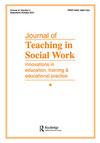Self-Care and Quality of Life: Associated Factors Among MSW Students
IF 0.9
Q3 EDUCATION & EDUCATIONAL RESEARCH
引用次数: 0
Abstract
ABSTRACTThere is an increasing concern for self-care and quality of life among Master of Social Work (MSW) students as they prepare to serve vulnerable individuals, families, and communities. Evidence suggests numerous benefits to practicing self-care; however, the majority of these studies focus on practitioners in the helping professions as opposed to graduate students working toward their degrees, suggesting a need for research. Accordingly, this study investigates the association between self-care actions, distress tolerance, mindfulness and quality of life among MSW students. A cross-sectional survey design, was used to examine these associations among 148 MSW students. Three multiple regression analyses were conducted to determine the relationship among the key variables. Results suggest that emotional self-care was significantly associated with quality of life, and that the level of engagement in self-care actions differed across students’ socioeconomic class. Students’ mindfulness and emotional self-care also were positively associated with distress tolerance. Findings suggest that promoting engagement in emotional self-care and mindfulness self-care may promote higher quality of life among MSW students. Implications for MSW programs and the potential to support students’ health and sustainable learning are discussed.KEYWORDS: Self-caredistress tolerancemindfulnessquality of lifeMSW programs AcknowledgmentsWe want to thank the busy MSW students who took time away from their course work to complete the study survey measures.Disclosure statementNo potential conflict of interest was reported by the author(s).生活自理与生活品质:都市固体废物学生的相关因素
随着社会工作硕士(MSW)学生准备为弱势个人、家庭和社区服务,他们越来越关注自我保健和生活质量。有证据表明,自我照顾有很多好处;然而,这些研究大多集中在帮助专业的从业者身上,而不是研究生,这表明有必要进行研究。因此,本研究旨在探讨生活垃圾学生的自我照顾行为、痛苦承受能力、正念与生活质量之间的关系。采用横断面调查设计,对148名城市生活垃圾学生进行调查。通过三次多元回归分析来确定关键变量之间的关系。结果表明,情绪自我照顾与生活质量显著相关,并且自我照顾行为的参与水平在不同社会经济阶层的学生中存在差异。学生的正念和情绪自理能力也与痛苦耐受力呈正相关。研究结果表明,促进情绪自我照顾和正念自我照顾可以提高城市垃圾学生的生活质量。对城市生活垃圾项目的影响和支持学生健康和可持续学习的潜力进行了讨论。关键词:自我照顾、痛苦承受、正念、生活质量、MSW项目致谢我们要感谢忙碌的MSW学生,他们从课程中抽出时间来完成这项研究调查措施。披露声明作者未报告潜在的利益冲突。
本文章由计算机程序翻译,如有差异,请以英文原文为准。
求助全文
约1分钟内获得全文
求助全文
来源期刊

Journal of Teaching in Social Work
EDUCATION & EDUCATIONAL RESEARCH-
CiteScore
1.20
自引率
0.00%
发文量
36
期刊介绍:
The Journal of Teaching in Social Work fills a long-standing gap in the social work literature by providing opportunities for creative and able teachers—in schools, agency-based training programs, and direct practice—to share with their colleagues what experience and systematic study has taught them about successful teaching. Through articles focusing on the teacher, the teaching process, and new contexts of teaching, the journal is an essential forum for teaching and learning processes and the factors affecting their quality. The journal recognizes that all social work practitioners who wish to teach (whatever their specialty) should know the philosophies of teaching and learning as well as educational methods and techniques.
 求助内容:
求助内容: 应助结果提醒方式:
应助结果提醒方式:


